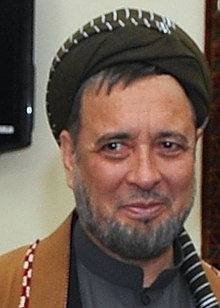Mohammad Mohaqiq
| Haji Mohammad Mohaqiq | |
|---|---|

Mohammad Mohaqiq in 2014
|
|
| Deputy Chief Executive Officer of Afghanistan | |
|
Assumed office 13 October 2014 Serving with Mohammad Khan Rahmani |
|
| Prime Minister | Abdullah Abdullah |
| Preceded by | Position established |
| Leader of PIUPA | |
|
Assumed office 15 January 2006 |
|
| Preceded by | New Party |
| Personal details | |
| Born | 1955 Mazar-i-Sharif, Balkh, Afghanistan |
| Nationality | Afghan |
| Political party |
Hezbe Wahdat (1990–2006) PIUPA (since 2006) |
| Residence | Kabul, Afghanistan |
| Occupation | Politician |
| Religion | Shia Islam |
Mohammad Mohaqiq (Persian: محمد محقق/Pashto: محمد محقق) is a politician in Afghanistan, serving as a member of the Afghan Parliament. He is also the founder and chairman of the People's Islamic Unity Party of Afghanistan. During the 1980s, he served with the mujahideen rebel forces fighting against the Soviet-backed Afghan government. After the withdrawal of the Soviet Union in 1989, Mohaqiq was appointed as the leader of the Hezb-e Wahdat for northern Afghanistan.
Mohaqeq was born in 1955 and hails from Mazar-e-Sharif in Balkh Province. He is an ethnic Hazara, the son of Sarwar. He holds a bachelor's degree in Islamic studies from Iran. Mohaqiq speaks Persian, Uzbeki and Arabic. He has been involved in mujahideen activities after the April 1978 Saur Revolution.
During the Afghan civil war in the early 1990s, he was regarded as a prominent leader fighting for his Hazara people. In the late 1990s, Mohaqiq joined the Northern Alliance (United Front) in their resistance and struggle against the Islamic Emirate of Afghanistan (Taliban). After the fall of the Taliban, he was appointed as the Vice President and the Minister of Planning in the interim government of Hamid Karzai.
Mohaqiq ran as a candidate in the 2004 Afghan presidential election. He came in third place with 11.7% of the votes after Hamid Karzai and Yunus Qanuni.
...
Wikipedia
